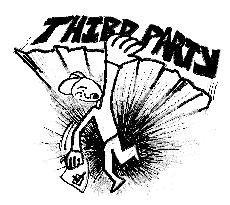Opinion: America’s other choice

Illustration
Sep 21, 2004
Ever get the feeling your vote truly does not matter anymore? When pollsters predict a Kerry or Bush victory in certain states despite the elections being months away, U.S. citizens can feel like their voice has already been spoken for them. With the exception of battleground states, pollsters typically declare which candidate will take which states before the polls even open.
My father refuses to vote in any elections. Concerning the presidential race, he tells me to look at both candidates. He considers President Bush definitely not worth voting for because of Iraq. And my dad feels Sen. John Kerry also isn’t worth voting for because he doesn’t have anything worthwhile to say. He views the candidates as two sides of the same coin.
I understand his frustrations. On one hand, voting is the most essential act of democracy the citizen can perform. But when you dislike both candidates and find neither one worth voting for, little else can be done to make your distaste for the two-party system and its candidates heard. Combine this with a system where the nation’s popular votes don’t matter, and an attitude of political apathy can develop.
Can anything be done to save non-voters in our country? How can we reinvigorate the public again if current candidates simply do not have personas worth fighting for? Who and what can be the savior of political America?
The answer is simple: third parties.
Get The Daily Illini in your inbox!
Sure, third-party candidates rarely, if ever, get elected to office. But while their base of support is small, their relative unpopularity gives them greater freedom of movement in the political arena. The media, along with the two mainstream parties, might dismiss third-party candidates as nothing more than radicals who hang by a few threads of support. But third-party candidates can hold values worth voting for.
In this election, the biggest third-party candidate obviously is Ralph Nader. Despite being a household name, many states have barred him from the ballot. Democrats see him as stealing votes and would rather keep Nader off the ballot than let democracy decide. Currently, Nader is on only 35 state ballots, and Illinois is not one of them.
So whom can the disenfranchised of Illinois vote for? If the biggest third-party candidate won’t be on the ballot, should voters relinquish their vote to the two-party system or perhaps not vote at all?
No. Illinois still has a third-party savior in the form of the Libertarian Party: Michael Badnarik. Don’t worry; I wasn’t familiar with who he was, either, until a few hours ago.
Taking a few moments to read through his official campaign Web site, I found that a few of my personal ideas fell right in line with his stances on certain issues. Badnarik and the Libertarians want to eliminate welfare, rid the Internet of censorship, cut taxes, fully support the rights of gun owners, stop foreign aid, legalize narcotics and save the environment. They seem to have a little something for everyone.
Understandably, many people refuse to vote for third parties because they see it as a futile gesture. After all, nobody expects the Libertarians, Greens or Reforms to win even one state’s electoral votes. But that doesn’t mean voters don’t have the ability to send a powerful message.
Third-party candidates may not win, but they are there for the people who want more choices and fresh ideas in the political arena. Help a third-party nominee receive 5 percent of the national popular vote, and they can receive federal funding for the next election.
The only wasted vote is a vote not cast. If voters are frustrated with the two-party system, staying home on Election Day will not help make this country a better place. As a citizen, you owe it to yourself, your country and those who died defending it to take a stance and vote. The United States’ third parties are a great place to start.
Kiyoshi Martinez a junior in journalism. His column runs Wednesdays. He can be reached at [email protected].





